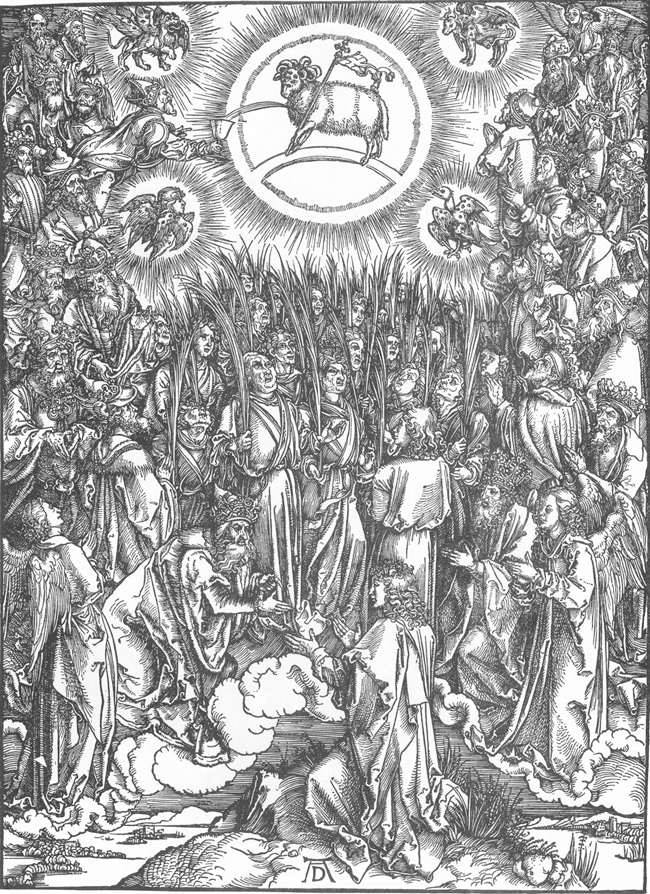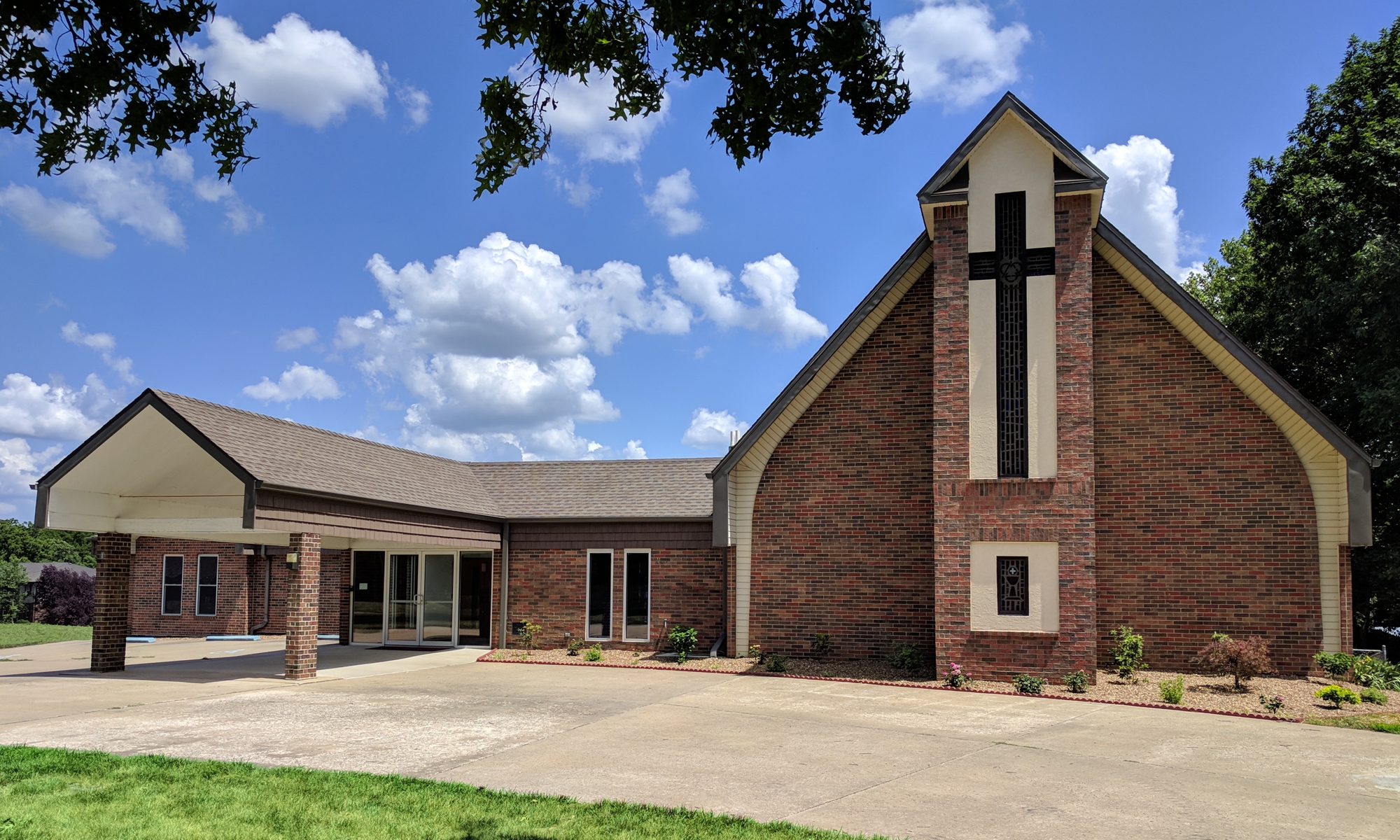
Lessons: Revelation 7:9-17, 1 John 3:1-3, Matthew 5:1-12
Hymns: LSB 596, 676, 677, 670, 672
Grace, mercy, and peace to you from God our Father and our Lord and Savior, Jesus Christ. Amen.
All Saints’ Day is a day of joy because we consider the saints resting in Heaven and the saints on Earth receiving the blessings of Christ. For many, there’s also sadness because we long to be with our loved ones in Heaven and miss them. A good question to ask today is “What is a saint?” Simply put, saints are holy ones—both those in Heaven and Christians here on Earth. This means you can be considered a saint—a holy one—even now.
But how? Have we not sinned in thought, word, and deed? Have we not been disobedient, unfaithful, or lazy? Have we not been hot-tempered, rude, or quarrelsome? Have we not hurt someone by our words or deeds? Have we not stolen, been negligent, wasted anything, or done any harm? If we are honest with ourselves, we have many sins to confess. After all, we believe these words of King David, “Who can discern his errors?” (Psalm 19:12) and “None is righteous, no, not one; no one understands; no one seeks God. All have turned aside; together they have become worthless; no one does good, not even one” (Rom. 3:10-12 quoting Psalm 14:1-3). We also find ourselves in the same shoes as St. Paul, who said, “I do not understand my own actions. For I do not do what I want, but I do the very thing I hate… I know that nothing good dwells in me, that is, in my flesh. For I have the desire to do what is right, but not the ability to carry it out. For I do not do the good I want, but the evil I do not want is what I keep on doing” (Rom. 7:15-20). And we are reminded of last week’s Epistle, “By works of the law no human being will be justified in his sight… For all have sinned and fall short of the glory of God” (Rom. 3:19-28).
All of this means that, on our own, we cannot make ourselves saints. We cannot purify ourselves or make ourselves holy. We have soiled ourselves by committing sin. We have also been soiled with the sin we have inherited from Adam through our parents. The children of Adam were born in Adam’s fallen image and likeness. We, too, are born in that same image and likeness—born as sinners.
Can we, then, call anyone a saint? The answer is “Yes!” But how? Through our goodness? No, for it is written, “All our righteous acts are like filthy rags” (Isaiah 64:6). Instead, our righteousness must come from outside of us. It is received from our Savior, Jesus. King David wrote, “Blessed is he whose transgression is forgiven, Whose sin is covered. Blessed is the man to whom the Lord does not impute iniquity, And in whose spirit there is no deceit… I acknowledged my sin to You, And my iniquity I have not hidden. I said, ‘I will confess my transgressions to the Lord,’ And You forgave the iniquity of my sin.” (Psalm 32:1-5). St. Paul wrote, “Wretched man that I am! Who will deliver me from this body of death? Thanks be to God through Jesus Christ our Lord!” (Romans 7:23-24). And, in last week’s Epistle, we heard that we “are justified [that is, forgiven] by his grace as a gift, through the redemption that is in Christ Jesus, whom God put forward as a propitiation by his blood, to be received by faith” (Rom. 3:24-25).
In our reading today from Revelation 7, we heard a glimpse of Heaven that the Apostle John saw. The saints in Heaven come from all nations who have “washed their robes and made them white in the blood of the Lamb.” They are purified of their sin through Christ Jesus who shed His innocent Blood on their behalf—who was crucified to take away their sin and rose from the dead for their justification.
Simply put, saints are holy ones who are forgiven by Christ. This forgiveness is granted to all who trust in Jesus as their Savior. It is not something we can earn, but it is a gift of God’s grace to all and on all who believe. God has never offered salvation apart from faith in Christ. Abraham believed and it was accounted to him as righteousness (Gen. 15:6). Habakkuk 2:4 says, “The just by his faith shall live.”
God doesn’t just let us off the hook when we believe in Him. Instead, what He does is far better. First, He sent His only begotten Son to bear our sin and pay the penalty we could not pay. Jesus shed His innocent blood in our place on the cross. You see, someone had to pay the penalty for our sin. God in His justice cannot just whisk our sins away or hide them under a rug. Instead, God demands that that justice is met. And since our debt with God is too great for us to pay due to our many sins, God the Father sent His perfect Son, Jesus, to pay for all our sins by dying on the cross in our place.
Second, God instituted ways for us to receive today the forgiveness of sins Jesus which earned for us some 2,000 years ago. Of course, this forgiveness is received by faith. But how does faith form in us? It does not come about by merely wishing for it. After all, we wouldn’t wish for it if we didn’t know about it. So, faith is worked in us by God the Holy Spirit as we hear His Word, receive the absolution, be baptized, and go to the Lord’s altar to receive the Body and Blood of Jesus in Holy Communion. Through these means of grace, the Holy Spirit imparts to us the very holiness of Christ. So, if He declares you to be holy, you are truly holy. That makes you a saint.
Yes, you will find yourself continuing to sin and be tempted to sin. And so, you keep on returning to where God places His holiness upon you. You keep coming back to the Lord’s House on the Lord’s Day to receive the forgiveness of sins and the righteousness of Christ.
Even in our Christian freedom and for several reasons, the Church has chosen Sunday as the main day to attend the Divine Service to receive the blessings of Christ. In Old Testament times, the Sabbath Day was Saturday. Work was forbidden. God’s people were commanded to rest from their labors so that they would focus on the saving Word of God. Their observance of the Sabbath offered no salvation, but God’s Word sanctified them and worked faith in them—bringing about salvation. When Jesus rose from the dead on a Sunday, this set a new pattern for the early church in which they set aside Sunday as the chief day for worship. After all, every Sunday is like a little Easter since our focus in church is always on our Savior, Jesus. And, just as God created the world in six days and rested on the Sabbath (making Saturday the day of rest in the Old Testament), so also in the New Testament Jesus rose from the dead (setting Sunday as the excellent patten for the Divine Service). Not only that, but number eight is the number for eternity and for the new creation. Jesus ushered these in at His Resurrection. A new week begins on the eighth day—a clean slate. We come to Church bearing our week’s worth of burdens and we go home justified, or forgiven in Christ. We give to the Lord just a couple of the first hours of our week and God blesses us with so much more than our offering of time and praise as He meets us with His gifts and bestows upon us His blessings.
In Old Testament times, boys were circumcised when they were eight days old to mark them as members of God’s family. It was an entrance into His covenant. The blessings they received (provided they continued to live by faith in the coming Messiah) were eternal blessings. By entering God’s family, they were entering eternity.
Now, in the New Testament, we no longer command circumcision. Instead, Christ has instituted something better—Holy Baptism. The Bible says, “In [Christ] you were circumcised with a circumcision made without hands, by putting off the body of the flesh, by the circumcision of Christ, having been buried with him in baptism, in which you were also raised with him through faith in the powerful working of God, who raised him from the dead. And you, who were dead in your trespasses and the uncircumcision of your flesh, God made alive together with him, having forgiven us all our trespasses, by canceling the record of debt that stood against us with its legal demands. This he set aside, nailing it to the cross” (Col. 2:11-14). So now, circumcision is replaced with Baptism. And God cancels out our debt and forgives our sin.
From this, we can conclude that even little Octavia is now a saint. She had inherited the sin of her parents and has even committed sin. But now she is added to God’s family and the debt of her sin is now cancelled. Through Baptism, God has given her a new identity, placing His name upon her. She belongs to Christ. She has died with Christ and risen with Him. Like the believers in the Old Testament, she is entering eternity. She is now a new creation, pure and holy in Christ, for her sin is completely forgiven.
Christians, seeing the connection between the Old Testament command to circumcise and the New Testament Sacrament of Baptism, have often chosen to make their baptismal fonts eight-sided. The baptized are, after all, a new creation, entering eternity—both signified by the number eight. In fact, the name Octavia is Latin for “eighth.” On this All Saints’ Day, she is a new creation, entering eternity, and made holy through the Blood of Jesus.
This makes Octavia a saint—a holy one. She will still sin, as we all do. But God has made it easy for us to remain saints. We don’t continue as saints by going through the motion of getting baptized and confirmed. We don’t remain saints by ignoring the blessings of Christ and staying home week after week. For the faith given to us in our Baptism will wither and die when we are disconnected from the Word. It’s like eating food. There’s no way we can live by saying, “Well, I ate meals a few times in life—when I was a newborn and when I was in eighth grade. That’s enough food for me.” We’d be dead. Let’s never allow our faith to die. So, let’s feed on His Word as much as we can—through family devotions and frequent Church attendance. For God the Holy Spirit only works faith in us through the Word and Sacraments so that we trust only in Christ as our Savior. And when this happens, we are considered saints—holy ones—acceptable to Heaven.
Who is a saint? They are holy ones—credited with the very holiness of Christ, cleansed by His Blood, and forgiven of all sin. Christians are saints—those in Heaven, and those on Earth. God grant you this status by grace through faith as He sustains you through His Word. Amen.
The peace of God which passes all understanding keep your hearts and minds in Christ Jesus to life everlasting. Amen

